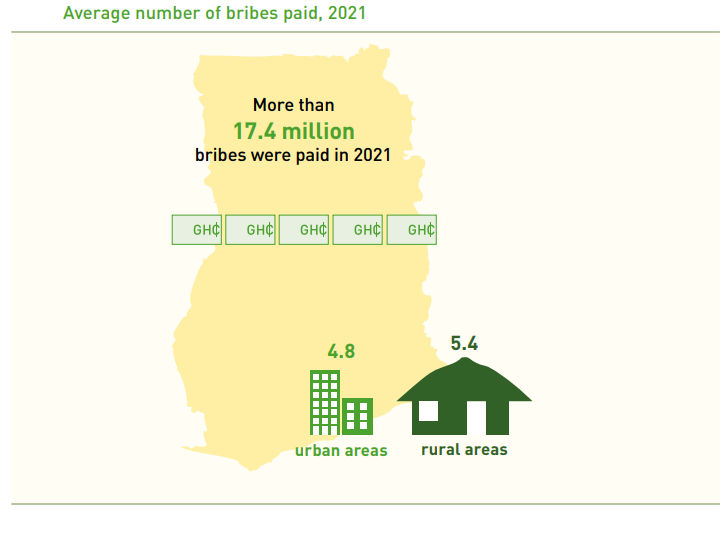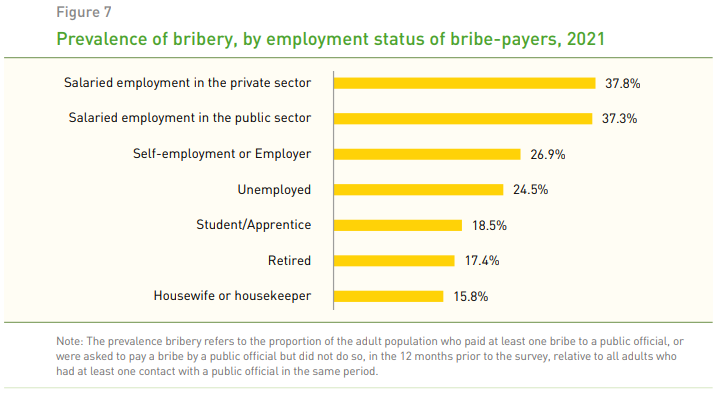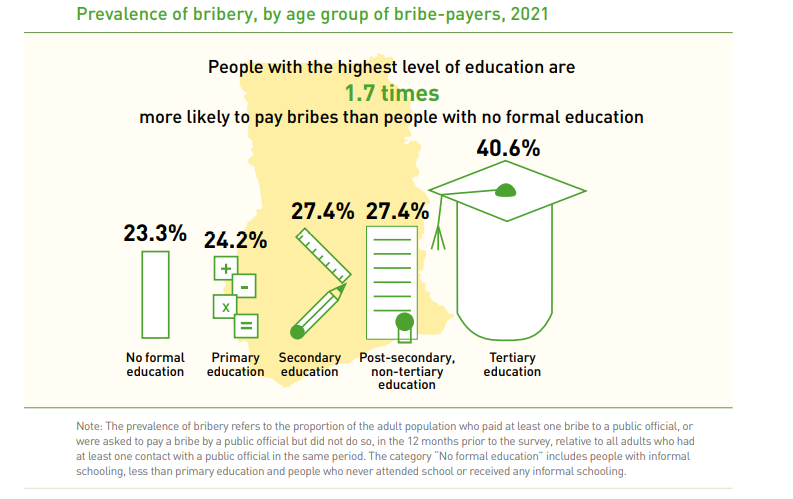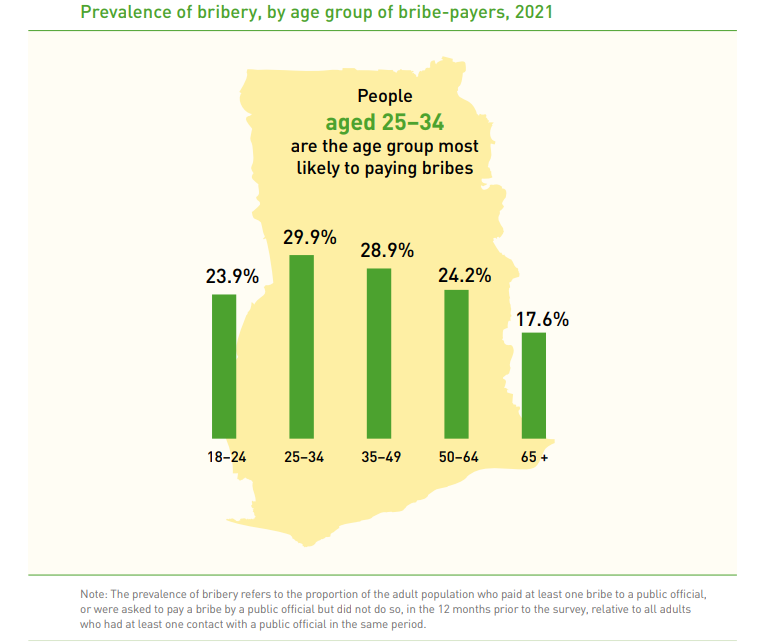
Audio By Carbonatix
About ¢5 billion in bribes were paid in both the private and the public sectors, a survey by the Ghana Statistical Service (GSS) has revealed.
The report dubbed '2021 Ghana Integrity of Public Services Survey' indicates that 26.7% public sector officials were engaged in bribery acts, whilst 9.1% were officials from the private sector.
According to Government Statistician, Professor Samuel Kobina Annim, corruption was prevalent within the Ghana Police Service.
The service recorded 53.2% corrupt cases, followed by the Ghana Immigration Service and the Ghana Revenue Authority with 37.4% and 33.6% respectively.
Prevalence of bribery in Ghana
The report also showed that the prevalence of bribery in Ghana is 26.7%, meaning one out of four people who had contact with a public official in the 12 months prior to the survey, had been asked to pay a bribe by a public official, or asked to pay bribe but refused to do so.

The survey revealed that, on average, there is no difference in the prevalence of bribery in rural and urban areas of Ghana. There are, however, sizable variations across the 16 regions of the country.
On regional basis, the prevalence of bribery in the Bono East, Savannah and Volta regions, for example, were substantially lower than the national rate. The three regions recorded corruption cases of 11.8%, 14.5% and 19.1% respectively.
In the Western North, Ahafo and North East regions, the corrupt cases reported were substantially higher, at 53.4%, 47.0% and 41.9% respectively.
In addition, the report showed that the prevalence of bribery in Ghana also varied across age groups.
“Younger adults are more likely to pay bribes than the older population. In 2021, with a prevalence of bribery of 29.9% Ghanaians aged 25 to 34 years were the age group most likely to pay bribes” the report pointed out adding that “the prevalence of bribery decreased steadily to 17.6% among those aged 65 and over, while bribery among the youngest adult age group 18 to 24 has a prevalence of 23.9%”.
Bribery among the educated
The survey further showed that people with different levels of educational attainment experienced bribery to a different extent, and many factors may explain the differences that influence the acts of bribery.
“One relates to the type of public official with whom people interact and the type of public services sought. It may also be common for corrupt public officials to target wealthier socioeconomic groups to a greater degree than poorer socioeconomic groups, as the former may be considered more likely to have the means to pay bribes", the report explained.
Indeed, the survey showed that the group most likely to interact with public officials and most likely to experience bribe requests is those with the highest level of educational attainment - that is bachelor’s degree or above.

This means that Ghanaians with the highest level of tertiary education are 1.7 times more likely than people with no formal education to report that they paid a bribe, or were asked to pay a bribe but refused when in contact with a public official.
Bribery in private sector
As in the public sector, the contact rate with private sector employees varied substantially across the regions of Ghana, with the contact rate being much higher in the Greater Accra, Western and Western North regions, at 59.1%, 50.0% and 45.0% respectively, than in regions such as the Upper West, Oti and Bono East, at 11.2%, 17.7% and 18.5% respectively.

Also, the contact rate with private sector employees is much higher in urban areas (46.9%) than in rural areas (27.6%) of the country as many more private services are more likely to be accessed in the former.
Prevalence of bribery in the private sector
The report revealed that not only is the contact rate with private sector employees in Ghana much lower than with public officials, but also the payment of bribes to private sector employees is much less prevalent than to public officials.
However, the prevalence of private sector bribery in 2021 was 9.1%, whereas the prevalence of public sector bribery was 26.7%.

In addition, compared with the public sector, where there is no notable difference in the prevalence of bribery in urban and rural areas, people are more likely to pay bribes to private sector employees in rural areas than in urban areas.
The report also said there are also notable variations in the prevalence of private sector bribery across the regions of Ghana.
Latest Stories
-
Parliament to probe SHS sports violence; sanctions to apply – Ntim Fordjour
21 minutes -
Upholding parental choice and respecting the ethos of faith-based schools in Ghana
22 minutes -
SHS assault: Produce students in 24 hours or we’ll storm your school – CID boss to SWESBUS Headmaster
46 minutes -
GSTEP inducts Greater Accra finalists, equips young innovators with critical skills for regional showdown
52 minutes -
CID boss warns against school violence after athletics attack in Swedru
1 hour -
Kotoka Int. Airport to introduce 3D scanners, end shoe removal for passengers
1 hour -
Mahama urges private sector participation in industrial water supply reforms
1 hour -
8 injured, 3 in critical condition after SHS violence – Awutu Senya DCE
1 hour -
Interior Minister supports prison inmates with Ramadan food donation
1 hour -
COA targets US$10m in investments for blue food sector through innovation hub
1 hour -
Manufacturing must contribute to 15% of GDP by 2030 – Mahama targets
1 hour -
Sports Minister orders NSA Director General to revoke 17 staff appointments over due process breach
1 hour -
Stabilisation alone won’t transform economy – Mahama
1 hour -
Aaron Kanor appointed Acting Commissioner of Customs
2 hours -
Ashanti police kill suspected robbery kingpin; four accomplices arrested
2 hours

